Here's How to Keep Your Pets Safe This Holiday Season, According to a Veterinarian
Here's a veterinarian's guide to keeping your pets safe around the holidays, including the foods to avoid feeding them and the toxic plants to keep out of reach
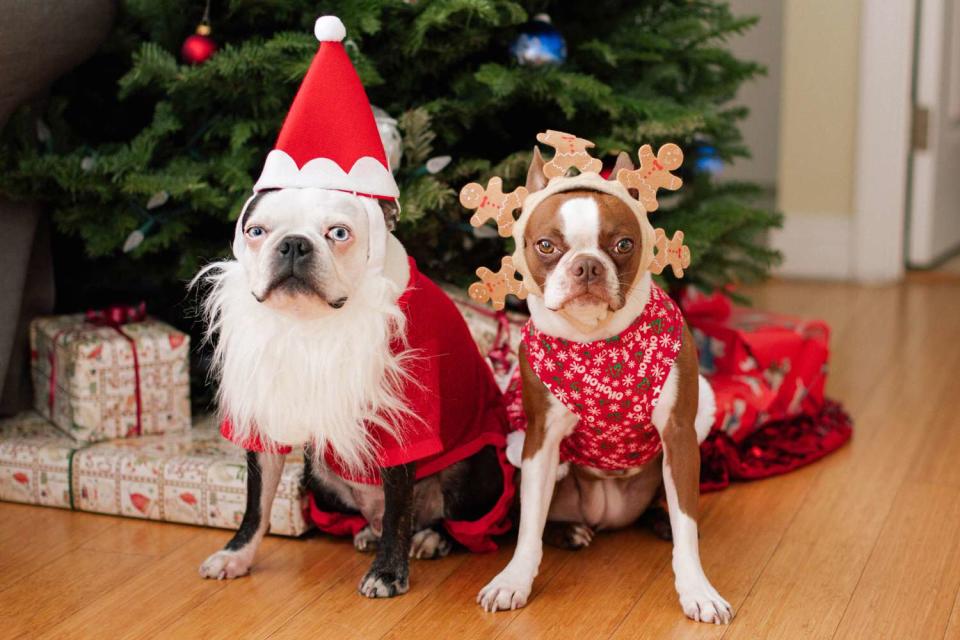
Getty
Human sweets aren't pet treats!
The holidays are an exciting time for all; however, various safety precautions should be taken in order to keep the season merry and bright for our friends with tiny claws and little paws.
PEOPLE spoke with Dr. Alea Harrison, Banfield Pet Hosipital's chief medical officer, to provide insight on the dos and don'ts to be aware of in an effort to protect your pet pals during this festive time of year.
"When we think about the holidays, it's just full of people, fun, celebration, family most of the times, and so sometimes we do let our guard down," Dr. Harrison exclusively tells PEOPLE. "This is the time of year that us veterinarians see a lot of what we call 'garbage gut.' "
Feeding your animals table food is among the most common mistakes pet owners make around the holidays. Despite it being the season of giving, sharing sweets and treats with your dogs and cats should be avoided.
The holidays are also a time of environmental change around the house, between the flashy decorations and loud crowds of people entering the home. These changes can be overwhelming for pets; Dr. Harrison says they might "start showing or expressing new behaviors" as a result.
Read on for expert tips and tricks to keep your pets safe this holiday season, according to Dr. Harrison's advice.
Related: The Cutest Videos and Photos of Animals Celebrating Christmas
Don't feed your pet table food
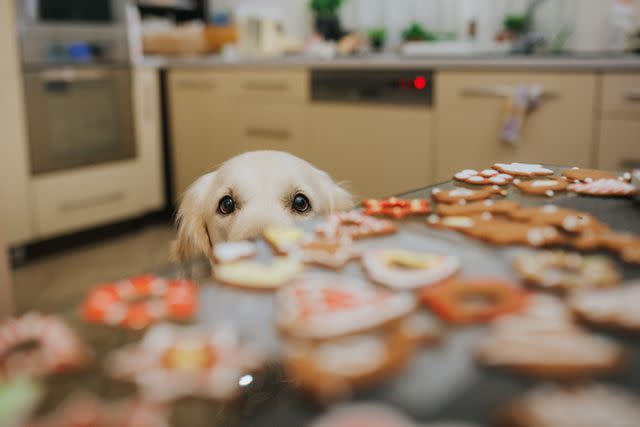
Getty
Dog looking at cookies on the table.Your freshly baked Christmas cookies are so good you want to share them with everyone; however, Dr. Harrison says that "there are foods that we eat as humans that can actually be toxic to dogs and cats."
Therefore, she says "it's important to remember not to give table food" to your pets in order to prevent the previously mentioned "garbage gut." Since the majority of human foods can be "very irritating to the GI tract of our dogs and cats," she stresses you stick to the usual diet your veterinarian recommends for your pets.
Among the "dangerous foods" Dr. Harrison says to be mindful of around your pets are garlic, onions, leeks, chives, chocolate, alcohol, grapes and raisins. She also notes yeasted dough as another when it comes to bread.
"Anything with that yeasted dough can have some rawness to it and we always want to be careful," she explains. "Let's also make sure that we're putting our coffee or our soda up high because they absolutely can get a caffeine toxicity."
Sugarless candy, too, she adds to the list. "Some gums and toothpaste have something called xylitol and that can cause liver failure, so we want to make sure that we're standing clear of sugarless candy."
For more information on the foods and drinks to keep away from your pets around the holiday season, Dr. Harrison recommends owners check out the ASPCA poison control website for an even more comprehensive list.
Related: Survey Finds Most Owners Buy Their Pet a Holiday Gift — but Only 58 Percent Wrap Those Presents
Don't give your pets ham bones to chew on
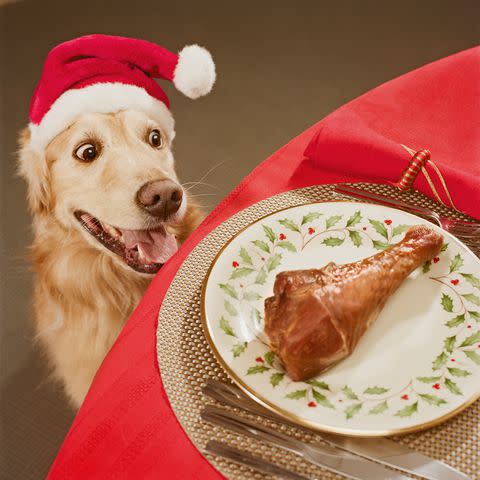
Getty
Dog in Santa hot looking at bone.Believe it or not, Dr. Harrison stresses the importance of keeping bones away from your pets when prepping your holiday feast. She says vets commonly see "a lot of obstructions" from ham, turkey and chicken bones.
Not only are they considered choking hazards for your dogs and cats, but they can cause blockage "if they can't pass through the intestines or the stomach," she says. In addition to obstruction, Dr. Harrison warns that bones can get stuck in their chins or jaws.
"I've seen someone's [pet] fracture their jaw based on chewing very hard bones," she shares, also noting that "cracked teeth" are also a possibility since some animals' teeth "aren't as strong or as strong as that bone" they are biting.
Keep candles away from your pets
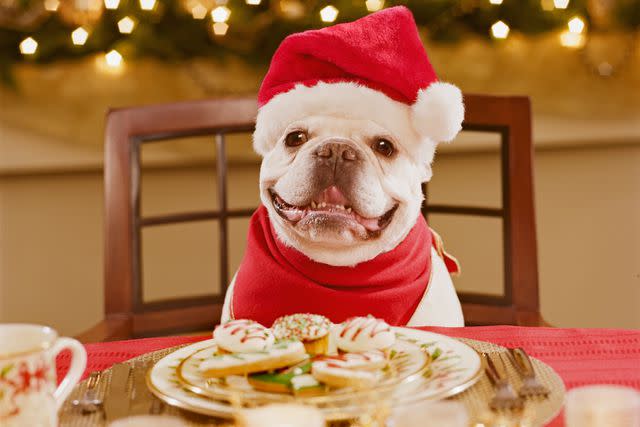
Getty
Dog at Christmas table.Candles can be hazardous for both humans and pets if not handles with care. While Dr. Harrison doesn't suggested avoiding candles completely, she advises to keep them "at a height where they can't be disturbed by the pets."
For dogs, Dr. Harrison says "happy tails" can easily knock over a candle. Therefore, she suggests placing it in a location away from the pup's wagging to avoid a fire hazard. For cats, she warns of whisker burns.
"My first cat I ever owned burned his whiskers on a candle that I had lit," Dr. Harrison recalls of her 9-year-old self at the time. "I learned I probably shouldn't have that candle because that cat is curious and will stick their face there."
Fortunately, Dr. Harrison says her cat was fine because she was there to take action; though she warns if she wasn't, "that absolutely could have caused burns to the pets as well as damage to the quarters where she lived."
Pets can be tempted to put their faces close to candles due to their aromatic scents. "They smell so good some dogs will try and eat it and then that can make them very sick, so those are also the things that we should all be mindful of," she adds.
Keep tinsel, ribbon and string out of your pet's reach
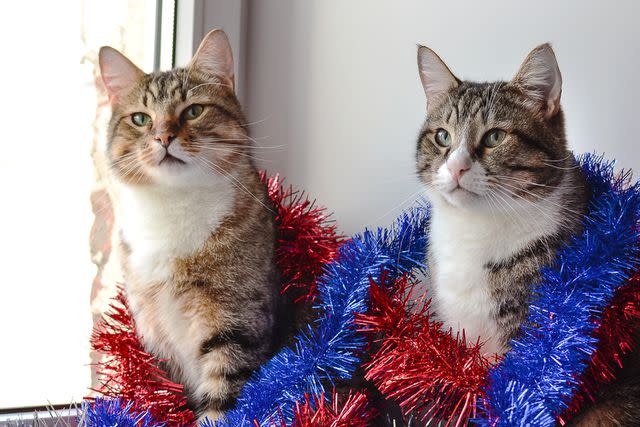
Getty
Cats wrapped in Christmas garland.Many holiday decorations use to wrap presents or adorn Christmas trees — like tinsel, ribbon and string — can be commonly mistaken for pet toys. If swallowed, Dr. Harrison says "they can really cause severe injury to the intestinal tract."
When injected, she says the string-like items can be hazardous to the pets' intestine and bunch up like an accordion as it starts to "bunch in there and get really taut" in the body. While she says it won't necessarily show up in an X-ray, there are other signs to be aware of like "vomiting, diarrhea and lethargy."
"If you start to see those things, it's really important that you take them to the vet right away and exercise caution," Dr. Harrison says. She also lists stockings as decorations to "keep up and away" from your pets, especially if objects are handing out of them.
Dr. Harrison emphasizes the importance of using "positive reinforcement," like having safe toys for your pets to play with instead. "If you see them playing with the tinsel or the ribbon just immediately replace it with something else," she suggests.
Related: Pet Expert Shares the Best Way to Give a Rescue Pet as a Gift: 'It's a Very Personal Decision'
Elevate tiny toys that may be pet choking hazards
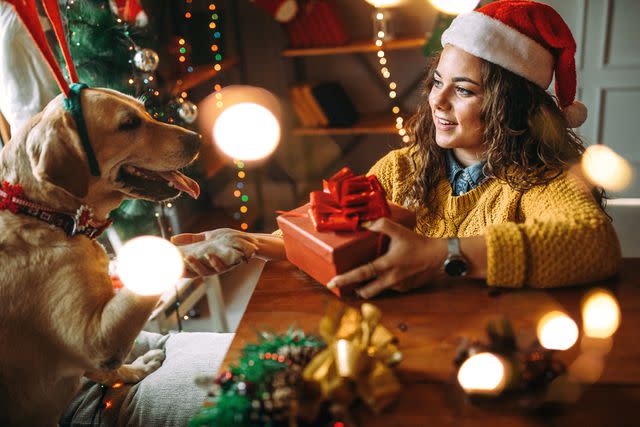
Getty
Dog and Christmas presents by tree.Just as adults are mindful of their little ones swallowing tiny toys, Dr. Harrison says the same precautions should be taken for their fur babies as well. "I've removed so many toys from dogs and cats," she shares.
"They absolutely can have choking and blockages similar to our children or kids, so it's best to make sure that we keep those pets away from those toys," she advises. "So if you have a certain room that has toys laying on the floor, you've got to shut the door."
Dr. Harrison also stresses guardians inform their children as an early age about the importance of picking up after themselves. "We've got to keep everybody involved to make sure that we're picking up toys when we're done playing with them and putting them away so that our pets can stay safe," she says.
But ingesting tiny toys isn't the only concern pet owners should put on their radar. Dr. Harrison says that stepping on them can cause "lacerations and puncture wounds" on their tiny little paws, too!
"So, it's not just about eating them," she makes clear.
Provide a calm space for your pet amid loud crowds
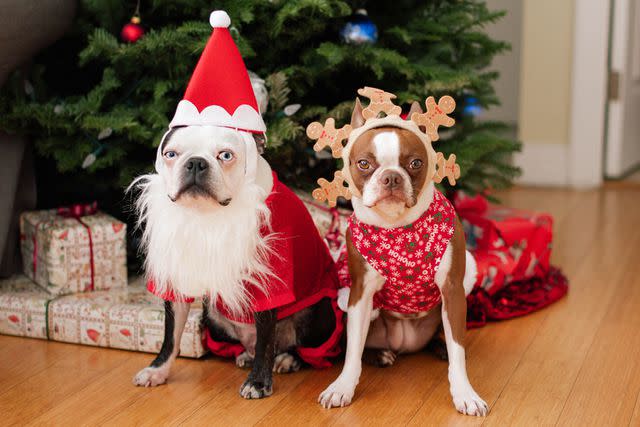
Getty
Dogs by Christmas tree.'Tis the season to be jolly! Though, the excessive crowds and extra-loud noises might make your pet uncomfortable because Dr. Harrison says "they can get anxiety during these times," too.
Some animals might react differently around crowds and change, like "hiding from certain activities" or "expressing new behaviors." Therefore, she says "sticking to a routine is key," like "making sure you feed them and play with them at their usual times."
Although Dr. Harrison says that it is possible to have pets around for holidays "just fine," she highlights the importance of owners being "mindful and knowledgeable" of ways to decrease their pets' stress if needed.
"Always provide a place for peace. Give them some place where they can go and feel safe, where they can be alone, where there's not a lot of commotion," she says. "Always make sure that they have food, water, or a litter box if it's a cat."
If new people are entering your home, Dr. Harrison says to "keep introductions very casual," especially if they are unfamiliar with the house guests. She advises against "throwing your pet into the excitement."
Don't let your pet drink the water from real Christmas trees
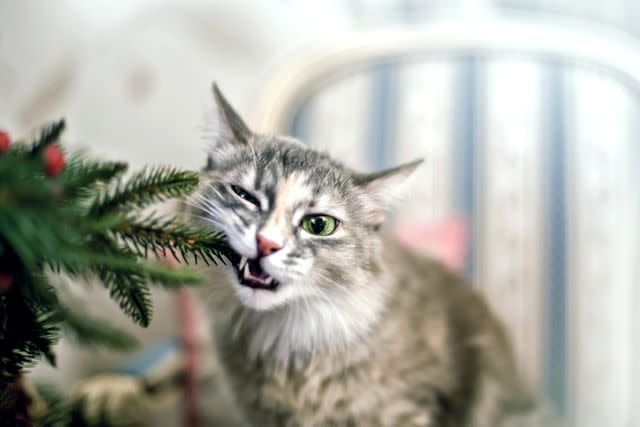
Getty
Kitten eating a Christmas tree branch.Regardless if your Christmas tree is real or fake, Dr. Harrison says the prickly pine needles that fall on the floor "can be agitating" for a pets' paws. Keep on top of sweeping and vacuuming to prevent your pet from stepping on them around the tree.
If you have a real Christmas tree, Dr. Harrison says it's important to be mindful of the water at its base since most of them are treated with chemicals to keep the tree green. "If that pet goes in there and tries to drink that water, it can be toxic," she says.
"If the pet does have access to the water under the tree, just make sure you're using clean, fresh water with no preservatives or no chemicals," Dr. Harrison explains. "Change it daily."
Don't dangle Christmas tree decorations
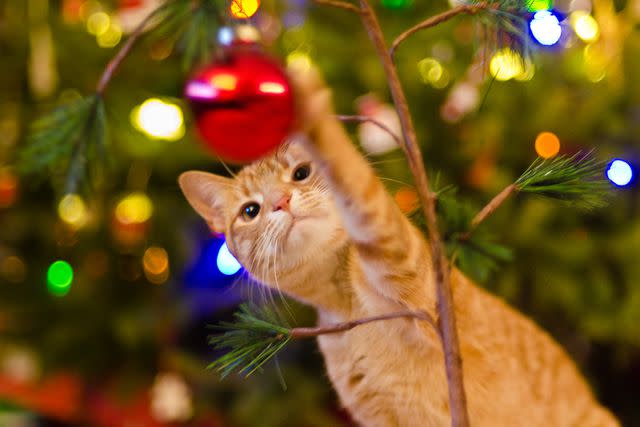
Getty
Cat playing with red ornament on Christmas tree.Like us humans, fury friends will also be taken by the shiny ornaments and decorations on the tree. "These all look like a playground for most of our pets," says Dr. Harrison. "They're naturally curious."
Dr. Harrison says string lights and other dangling objects are among the decorations to be mindful of when adorning your Christmas tree or furniture around the house. Keeping ornaments off the lower branches and placing them higher up is a tip she suggests.
"Eventually the novelty will wear off," she says of the period after first introducing the exciting new objects to your pets. If you're not home, she recommends keeping "them away" to be extra safe.
Avoid putting food-filled gifts under the Christmas tree
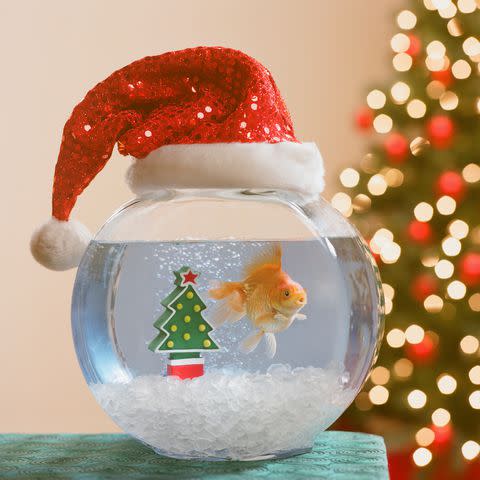
Getty
Christmas gold fish bowl.Dr. Harrison says to "avoid putting gifts under the tree that contain food" if possible. "Don't forget, [animals] have a great, great sense of smell!" She recalls having had a few frustrated owners who were left with damaged packaging after their pets "got ahold of the chocolates that were under the tree."
Keep poisonous plants away from your pets
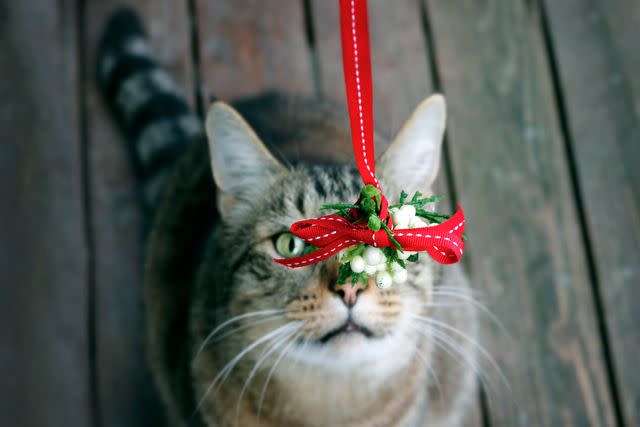
Getty
Cat look at a Christmas mistletoe.Similar to safety precautions taken around chemicals in real Christmas trees and the water they sit in, Dr. Harrison says there are certain holiday plants that are naturally toxic and should be kept away from pets overall.
"Poinsettias are extremely toxic to pets so I would avoid it all costs or put it up very, very high up so that they can't get to it," she says, adding that mistletoe and pine needles can also "cut their mouths" because they are sharp.
"If pine needles are ingested absolutely they can be dangerous and even sometimes deadly," Dr. Harrison says. "Just imagine your intestines are kind of like a rope and when you try and fit something in there it can get blocked and that can become very severe."
Lastly, Dr. Harrison warns of holly's toxicity, in addition to mistletoe. "We absolutely want to make sure that we keep those away."
"I'm not saying don't have plants," clarifies Dr. Harrison. "Just make sure that you're mindful of where you're placing them and the access that your pet has to them.
Talk to your vet before traveling for the holidays
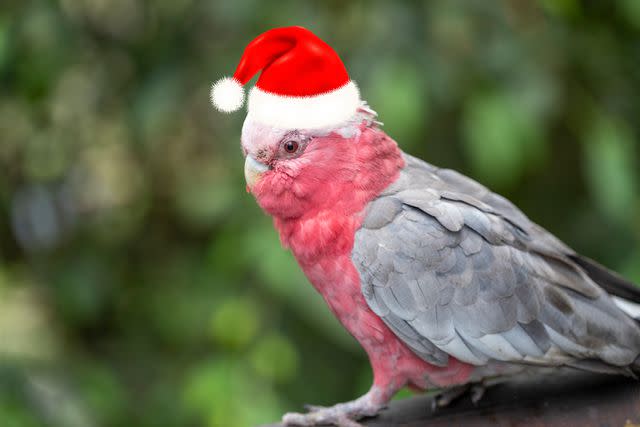
Getty
Bird wearing a Christmas hat.If you're traveling for the holidays, Dr. Harrison says it's a good idea to ask your vet about whether or not to bring your pet along for the ride. If your pet gets anxious or reacts a certain way around change, those are a few factors she says to take into consideration.
"You absolutely have to partner with your veterinarian," Dr. Harrison says.
For more ways to protect your pets when traveling, tune into Banfield Pet Hospital's latest podcast episode Whisker Wonderland: Safe holiday guide for pets, in which veterinarian Dr. Saskia Bogman discusses more environmental changes that can impact your pets over the holidays, how to plan to make sure they are safe and how to minimize pet stress.
For more People news, make sure to sign up for our newsletter!
Read the original article on People.

